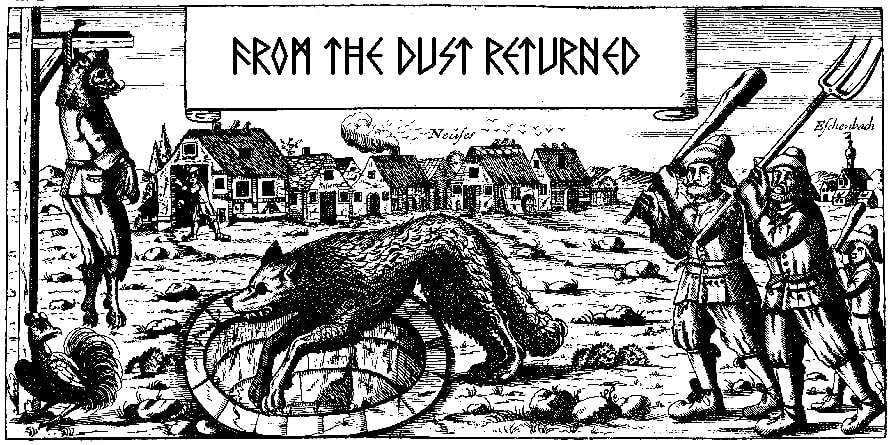 In 1992, Germans Deathrow and Americans Psychotic Waltz were among the few bands carrying the torch for progressive thrash metal at large, though the former's career was waning and the latter simply never got the established fanbase they probably deserved. People don't like to think and they don't often like their metal to think, but that's another story for another time. At any rate, the bands had the opportunity to tour together for the underwhelming Life Beyond and Into the Everflow albums they had recently released, and it appears a good friendship was formed between guitarist Uwe Osterlehner (who had joined Deathrow to help create their masterful Deception Ignored) and Dan Rock and Norman Leggio of Psychotic Waltz. Thus, the three of them enlisted bassist/keyboard player Siggi Blasey and decided to write and record an album under the name End Amen.
In 1992, Germans Deathrow and Americans Psychotic Waltz were among the few bands carrying the torch for progressive thrash metal at large, though the former's career was waning and the latter simply never got the established fanbase they probably deserved. People don't like to think and they don't often like their metal to think, but that's another story for another time. At any rate, the bands had the opportunity to tour together for the underwhelming Life Beyond and Into the Everflow albums they had recently released, and it appears a good friendship was formed between guitarist Uwe Osterlehner (who had joined Deathrow to help create their masterful Deception Ignored) and Dan Rock and Norman Leggio of Psychotic Waltz. Thus, the three of them enlisted bassist/keyboard player Siggi Blasey and decided to write and record an album under the name End Amen.Stylistically, we really have a natural merger between the two 'parent' bands, with some liberties taken to incorporate synthesizers and a tendency towards accessible, progressive rock patterns. Uwe decided to take up the vocal reins, and he's got a nasally, melodic voice that is not entirely out of reach of Milo's performance on Deception Ignored, with a streak of less inspired Kai Hansen. The riffing is complex and quite good throughout Your Last Orison. The songs don't really create the schizoid scenarios found in the maze-like compositions of Deception Ignored, but most of the guitars and leads are well plotted. In all, this is a rare one-off album that should please fans of the bands Mekong Delta and Depressive Age, who showed a similar restraint to their explosive abilities on a number of records.
"World in Decay" functions on a heavy use of synthesizers against which the guitars throttle and thrash. The verse is quite simple, with simple mutes creating groove and momentum below Uwe's charismatic but awkward vocals, but it really picks up in the chorus with a sweet speed metal lick. The chorus vocals are predictable but the shriek was not, and the lead sequence is rather good, as notes crescendo across the immediate sky. I like the mood of the synth in the bridge, subtly elevating alongside the mutes (for more of this style, try Sadist's 2010 album Season in Silence which is superb). "Prisoners in Posterity" erupts with some bleating, glorious guitars scintillating alongside keyboards, almost with a power metal mentality, and for a few seconds it erupts into full-blown Deathrow territory before the simpler verse chugs. "End Amen" is a prog piece with clean guitars, samples, and vocals howling for a few minutes before a metal rhythm at last blows in over some funky percussion, and "Rebirth" has riffs very much reminiscent of Deception Ignored, and I wonder what would have happened if that band had stayed writing in this style instead of Life Beyond.
The latter half of the record follows suite, but perhaps takes off further on a tangent with the bizarre interlude "Mystic Mountains", which balances guitar feedback, Rush-like bass, pitch shifted, sparse vocals and jamming drums into something unusual and indulgent. "A New Day's Absurdity" once again laminates Norm Leggio's drumming with a tribal slant before the phased bass starts to pop in and out and then the band breaks out their most varied composition on the album, and quite a good one if you can bear the vocals. "Nocturnal March" and the title track are nice thrashers with some synth lines, the title evoking some desert-like mystery through the shining guitars and mystic vocal lines. Closer "Silence" is another oddity with programmed drums, swelling guitar chords and moody ambient atmosphere, but I kind of liked it.
Uwe and the Psychotic Waltz really were a match made in heaven, and if you can stand a few of the small faults of this project, it's quite a great listen with some depth and diversity. They're talented musicians all around, but perhaps Osterlehner was not quite ready for the vocals. He excels in places, sounding like a Milo (Deathrow) or Leszek Spiegel (Mekong Delta, etc), but seems as if he could use more gestation or training of his pipes. Either way, though, I honestly enjoyed this more than Life Beyond and a number of albums by the American component, and it's a shame End Amen couldn't take off into something more than a one-shot. Frankly, though, it would have fallen on deaf ears at the time it manifested. If you find yourself enthralled by the works of Mekong Delta, Watchtower, Calhoun Conquer, Paradox, Depressiv Age/D-Age, and later Deathrow, then this is certainly something you would value in your collection.
Verdict: Win [8/10] (there's someone in the silence)

















